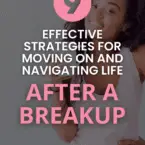
The Complexity and Emotional Turbulence of a Breakup
Breakups are a complex whirlwind of emotions, often leaving us feeling like we’re on an emotional roller coaster. One moment you may feel free and empowered, ready to embrace the next chapter of your life. The next, you may be consumed by feelings of loneliness, sadness, and uncertainty, grappling with questions like “What now?” and “How do I move forward?” This emotional turbulence is completely normal, and it’s important to remember that you’re not alone in your journey.
The Purpose of This Article
This article is designed to be a comforting companion during this tough time, providing you with practical strategies to help you navigate life after a breakup. It is packed with tips to foster understanding and acceptance, encourage self-compassion, maintain a healthy distance, lean on your support system, and prioritize self-care. We’ll also discuss how to channel your energy into new activities, embrace solitude, and focus on personal growth.
No two breakups are the same and everyone’s healing journey is unique. But rest assured, with patience and the right strategies, you can weather this storm and come out stronger on the other side. So, let’s dive into these ten effective strategies for moving on and navigating life after a breakup.
1. Understanding and Acceptance
The Importance of Understanding and Accepting the End of the Relationship
The journey of moving on begins with understanding and accepting the end of your relationship. It may sound simple, but it’s often one of the most challenging steps. Acknowledging that your relationship has ended means facing the reality that life, as you knew it, has changed. This can feel daunting, but it’s a vital part of your healing process.
Understanding refers to recognizing why the relationship ended. This might involve identifying the issues or differences that led to the breakup. It’s about seeing things clearly without the rose-colored glasses of nostalgia or the blinding effects of resentment.
Acceptance, on the other hand, means making peace with this reality. It’s the process of releasing resistance to what has happened and understanding that it’s a part of your past, not your present or future. It’s a critical step in liberating yourself from the weight of the past and opening up to the possibilities of what lies ahead.
Tips to Achieve Acceptance
Acceptance doesn’t happen overnight. It’s a journey, and here are a few tips to help you along the way:
Give it Time: Acceptance can’t be rushed. Allow yourself to feel all the emotions that come your way. It’s okay to grieve the end of the relationship. With time, the intensity of these emotions will lessen, and acceptance will gradually take their place.
Practice Mindfulness: Being mindful means being fully present and engaged in the moment, rather than dwelling on the past or worrying about the future. This can help you acknowledge your feelings without letting them overwhelm you.
Stay Active: Physical activity, such as yoga, jogging, or dancing, can help release pent-up emotions and reduce stress, making it easier for you to process your feelings.
Talk it Out: Discussing your feelings with trusted friends or a mental health professional can help you process your emotions and come to terms with the end of the relationship.
Remember, acceptance is not about forgetting the past or pretending it didn’t hurt. It’s about acknowledging what happened, learning from it, and using that knowledge to move forward with resilience and grace.
More: 7 Steps to Acceptance After a Breakup >>
2. Self-Compassion
The Concept of Self-Compassion After a Breakup
Self-compassion is about treating yourself with the same kindness, care, and understanding you would offer to a dear friend. In the context of a breakup, it means acknowledging that you’re going through a challenging time and recognizing that it’s okay to not be okay. It involves being gentle with yourself, letting go of self-judgement, and understanding that everyone experiences pain and setbacks in life.
During this time, it’s essential to replace self-criticism with self-compassion. You might be tempted to blame yourself, second-guess your decisions, or dwell on your perceived shortcomings. However, beating yourself up only adds to your suffering. Instead, allow yourself to feel, heal, and grow from this experience.
Practicing Self-Compassion After a Breakup
Here are some practical ways to practice self-compassion during this transitional phase:
Practice Mindful Self-Talk: Pay attention to how you talk to yourself. Is it harsh and critical, or gentle and understanding? Try to reframe negative self-talk with kinder and more compassionate thoughts. For example, instead of thinking, “I messed up,” you might say, “I made a mistake, but that doesn’t define me.”
Indulge in Self-Care Activities: These could be as simple as taking a long, relaxing bath, reading a book, or preparing a meal you love. Remember, taking care of your physical well-being also positively impacts your emotional health.
Express Yourself: Writing in a journal, creating art, or even talking to a friend can help you process your feelings. It’s important to validate and express your emotions rather than suppress them.
Reach Out to Others: Isolation can exacerbate feelings of self-criticism and loneliness. Connect with loved ones or seek professional help if needed. Remember, it’s okay to ask for support.
Practice Mindfulness: This can involve meditation or just spending a few moments each day focusing on your breath. Mindfulness helps you stay present and engage in self-reflection without judgment.
Moving on after a breakup is a journey of healing and self-discovery. By practicing self-compassion, you allow yourself to navigate this path with empathy and kindness towards yourself, bolstering your resilience as you step into the next chapter of your life.
3. Cut Ties Where Necessary
The Importance of Creating Space for Healing
It’s an undeniable fact: breakups hurt. You’ve shared a significant part of your life with someone, and now they’re no longer there. One of the crucial steps in healing and moving on after a breakup is creating a healing-friendly space—physically, digitally, and emotionally.
When a relationship ends, reminders of your ex-partner can prolong the pain and make it harder to move on. That’s not to say you should erase all memories of the relationship, but creating some distance can help you start to heal.
Cutting Ties and Maintaining Healthy Distance
Here are a few practical steps to help create that necessary space:
Physical Space: Avoid frequenting places you used to visit together—at least for a while. Instead, find new hangouts or re-visit old favorites that don’t carry strong associations with your ex.
Digital Distance: It might be helpful to unfollow or mute your ex’s social media profiles. This doesn’t have to be permanent, but it’s beneficial while you’re in the healing process. Also, resist the urge to constantly check up on them online. It’s natural to be curious, but it can delay your healing.
Emotional Boundaries: Limit communication with your ex, especially if it tends to lead to arguments or emotional distress. If total no-contact is not possible or necessary, aim for respectful, neutral communication. Keep it brief and stick to the point. Avoid getting drawn into discussions about the relationship or your personal lives.
Respect Their Space Too: Just as you need space to heal, so do they. Even if it’s tough, try to respect their boundaries and give them the space they need.
Clear Out Reminders: If having reminders of your ex around—like pictures, gifts, or clothes—is causing pain, it’s okay to put them away. You can decide later if you want to keep them, toss them, or return them.
Cutting ties doesn’t mean you’re shutting the person out of your life forever. It means you’re creating the necessary space for your healing. Once you’re more healed and moved on, you can decide what type of relationship, if any, you want to have with your ex. It’s all about doing what’s best for your emotional health.
4. Lean on Your Support System
The Crucial Role of a Support System
In the midst of a breakup, when emotions run high and you’re feeling particularly vulnerable, a support system plays a vital role. Support from people who care about you can be incredibly healing. They provide a listening ear, much-needed comfort, a different perspective, and even a distraction when you need it.
Your support system is not just there to help you process your emotions, but also to remind you that you’re loved and appreciated outside of the relationship you’ve just left. This can help boost your self-esteem and reaffirm your value, both of which can take a hit after a breakup.
Leaning on Friends and Family
While everyone’s support system looks different, friends and family are typically integral parts of it. Here’s how you can lean on them during this challenging time:
Open Communication: Share your feelings and thoughts with trusted friends and family. Be honest about what you’re going through. You don’t have to go into all the details, but expressing your emotions can be therapeutic and relieve the burden you’re carrying.
Seek Advice: If you feel comfortable doing so, seek advice from those who’ve been in your shoes. Sometimes, the wisdom of those who’ve navigated similar experiences can be incredibly helpful.
Spend Quality Time: Plan activities with your friends and family. This doesn’t mean you need to be busy all the time. Even simple activities like watching a movie, cooking together, or going for a walk can make a significant difference.
Accept Help: It’s okay to accept help. If friends and family offer to help—whether it’s making a meal, helping with chores, or just offering a shoulder to lean on—let them. It’s not a sign of weakness but a way to strengthen your bonds with them.
Remember, it’s okay to lean on others during this time. You don’t have to navigate your breakup alone. By accepting support from your loved ones, you’re taking an essential step towards healing and moving on.
5. Seek Professional Help if Needed
The Benefit of Professional Help
While a strong support network of friends and family can be incredibly beneficial during a breakup, there are times when seeking professional help can be a wise decision. Therapists and counselors are trained to help you navigate complex emotions and can provide you with tools and strategies to manage the difficult process of moving on.
Professional help can be especially beneficial if you find that your emotions are too overwhelming to handle, if you’re struggling with feelings of depression or anxiety, if the breakup has triggered past traumas, or if you simply feel stuck and unsure of how to move forward.
Finding a Suitable Professional
If you decide to seek professional help, here are some tips to find the right person for you:
Research: Spend time researching therapists or counselors in your area. Look at their specialties and areas of expertise to find someone who aligns with what you’re seeking.
Consultations: Many therapists offer a free or low cost initial consultation. This can be a great opportunity to get a feel for their style and see if you’re comfortable with them.
Insurance and Cost: Check if your insurance covers therapy. If not, don’t be discouraged. Many therapists operate on a sliding scale based on income, so it’s worth asking about this.
Online Therapy: If face-to-face sessions aren’t feasible for you, consider online therapy platforms. They can provide flexibility in terms of scheduling and you can attend sessions from the comfort of your home.
Seeking professional help is not a sign of weakness. It’s a proactive step towards healing and thriving. Every journey is unique, and what works for one person might not work for another. The important thing is that you’re taking care of your mental and emotional well-being during this challenging time.
6. Prioritize Self-Care
Self-Care After a Breakup
In the aftermath of a breakup, self-care becomes more essential than ever. It’s not just about pampering yourself – although that’s certainly a part of it – but it’s also about acknowledging your needs and taking steps to fulfill them. Self-care is about nurturing your physical, emotional, and mental well-being. It’s about giving yourself permission to rest, heal, and recharge, so you can navigate through this transitional phase in a healthier and more balanced way.
Self-Care Strategies
Here are some self-care strategies that can help you during this time:
Physical Well-being: Prioritize your physical health. This could mean maintaining a balanced diet, staying hydrated, engaging in regular physical activity, getting enough sleep, or even just taking a relaxing bath. Your physical health has a big impact on your emotional well-being, so it’s crucial to take care of your body.
Emotional Self-Care: Allow yourself to feel your emotions without judgement. Write in a journal, cry if you need to, laugh when you can. Reach out to friends and family, or seek professional help if your emotions feel overwhelming.
Mental Self-Care: Engage in activities that promote mental relaxation and well-being. This could include meditating, reading, doing puzzles, or any activity that you find mentally stimulating and relaxing.
Social Self-Care: Spend time with people who uplift and support you. This could be friends, family, or support groups. Being around others can help alleviate feelings of loneliness and isolation.
Soulful Self-Care: Do things that feed your soul. This could be spending time in nature, practicing yoga, meditating, praying, or any other activity that helps you connect with your inner self and the world around you.
Remember, self-care is not selfish. It’s necessary. Especially during times of emotional distress, taking care of yourself is one of the most powerful things you can do.
7. Channel Your Energy into New Activities
The Benefits of New Activities
Engaging in new hobbies or activities is a powerful way to navigate life after a breakup. Not only does it occupy your time and distract you from any negative thoughts, but it also helps you rediscover who you are outside of the relationship. New activities can provide an outlet for your emotions, boost your confidence, help you make new connections, and even introduce you to new aspects of yourself. They give you something to look forward to, creating a sense of anticipation and excitement that can be incredibly healing.
New Activities and the Healing Process
Here are a few examples of activities that you might consider and how they can assist in the healing process:
Physical Activities: Exercise, such as yoga, running, or joining a dance class, can help relieve stress and boost your mood through the release of endorphins, often referred to as “feel-good” hormones.
Creative Pursuits: Engaging in creative activities like painting, writing, or learning to play an instrument can provide a therapeutic outlet for your emotions and help you express feelings that you might find hard to put into words.
Educational Ventures: Learning something new, like a foreign language or cooking skills, can boost your confidence and self-esteem. Plus, it’s an excellent way to divert your mind from the breakup.
Volunteer Work: Giving back to your community can help you regain a sense of purpose and fulfillment, taking the focus away from your pain and allowing you to connect with others in a meaningful way.
Travel: Exploring new places can offer a fresh perspective and a change of scenery. It can also be a great opportunity for self-discovery and adventure.
Remember, these activities are not about replacing or forgetting the past, but about creating a new chapter in your life where you can find joy, fulfillment, and a renewed sense of self.
8. Embrace Solitude
The Importance of Being Comfortable in One’s Company
A significant part of moving on and navigating life after a breakup involves learning to embrace solitude. During a relationship, we often get accustomed to having someone constantly in our life, and the sudden absence of that companionship can feel jarring. However, solitude isn’t synonymous with loneliness. It is an opportunity to get to know yourself better, to sit with your feelings without distraction, and to gain a deeper understanding of what you truly want and need in your life.
Being comfortable with your own company can also lead to a stronger sense of self, increased independence, and greater self-love and acceptance. It is a crucial part of healing after a breakup, providing a space for introspection and growth.
Embracing and Enjoying Solitude
Here are some strategies to embrace and enjoy solitude:
Start Small: If you’re unaccustomed to being alone, start with short periods of solitude and gradually increase the time. You could begin with a quiet morning coffee, a solo walk, or reading a book in silence.
Create a Self-Care Routine: Use this alone time to cultivate a self-care routine. It could be anything from a skincare regimen to a daily meditation or yoga practice. Make it a time to nourish your body and soul.
Cultivate Interests: Use this time to delve into your interests. Whether it’s reading, gardening, painting, or watching your favorite show, doing something you love can make your time alone enjoyable and rewarding.
Practice Mindfulness: Embrace solitude by being present in the moment. Mindfulness practices such as meditation or even mindful cooking or cleaning can be very therapeutic and make solitude a time of relaxation and self-discovery.
Journaling: Write your thoughts, feelings, and experiences in a journal. This can be an extremely therapeutic practice, helping you process your emotions and reflect on your journey.
Remember, solitude is a journey of self-discovery, and learning to enjoy your own company is a gift you give to yourself.
9. Focus on Personal Growth
Personal Growth From Painful Experiences
While breakups are often associated with heartache and pain, they also serve as catalysts for personal growth. They push us out of our comfort zones, compel us to reassess our lives, and offer invaluable lessons about relationships and our own selves. Painful experiences like breakups are not just endings; they are also beginnings of a new phase of personal discovery and growth.
During this time, you have the opportunity to understand what worked and what didn’t in your previous relationship, identify areas for self-improvement, and make changes that lead to a more fulfilled and authentic life. It’s a chance to redefine your life on your own terms and move forward with newfound wisdom and resilience.
Strategies for Focusing on Personal Development Post-Breakup
Here are some strategies to focus on personal development after a breakup:
Self-Reflection: Take some time to reflect on your past relationship. Identify the lessons you’ve learned and use this knowledge to improve your future relationships. Consider journaling as a tool to help with this process.
Set Personal Goals: Setting goals can give you a sense of purpose and direction. These goals could be related to your career, fitness, education, or personal interests. Achieving them can boost your confidence and reinforce your sense of self.
Invest in Learning: This could be the perfect time to acquire new skills or knowledge. Whether it’s through online courses, books, or workshops, continuous learning contributes to personal growth and can be a great distraction.
Self-Care: Prioritize self-care and wellness. This can involve physical activities, proper nutrition, mindfulness practices, or anything that contributes positively to your mental and physical well-being.
Seek Constructive Feedback: Don’t hesitate to ask trusted friends or family members for their perspectives. They can provide constructive feedback and insights that could help in your personal growth journey.
A breakup doesn’t define you; it refines you. Every experience, especially the painful ones, brings you one step closer to becoming the person you aspire to be.
Final Thoughts
Recap of the Strategies
Moving on and navigating life after a breakup is a unique journey for everyone. However, understanding and acceptance, self-compassion, creating healthy boundaries, leaning on your support system, seeking professional help if needed, prioritizing self-care, engaging in new activities, embracing solitude, and focusing on personal growth are all proven strategies that can facilitate your healing process and help you move forward.
Positive Closure: Embrace the Potential for Growth and Happiness
As we conclude, remember that a breakup is not the end but a fresh start. It’s an opportunity to rediscover yourself, reassess your needs and wants, and ultimately, foster personal growth. Embrace this phase as a time for healing and self-improvement. Although moving on might feel like an uphill task right now, rest assured that each step, however small, is bringing you closer to a happier, healthier version of yourself.
Through this challenging time, bear in mind that it’s okay to feel pain and it’s okay to take time to heal. Be patient and kind with yourself. As the old adage goes, “This too shall pass.” And when it does, you’ll emerge stronger, wiser, and more equipped for future relationships.
Remember, your worth is not determined by the end of a relationship. You are complete, just as you are. So here’s to moving on, to breakthroughs, and to a future filled with potential and happiness.
















